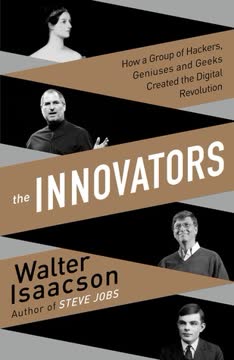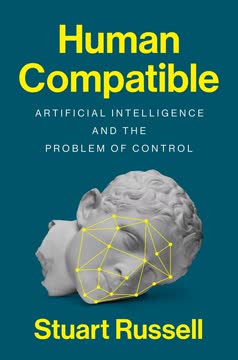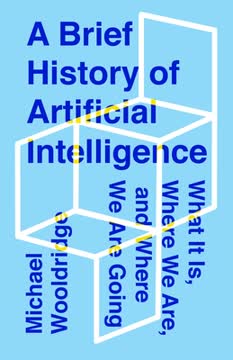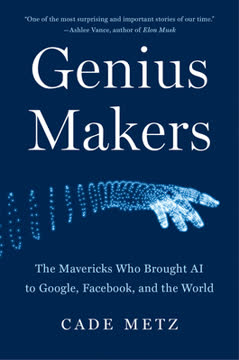Key Takeaways
1. AI pioneers paved the way for deep learning revolution
"In the early '90s, Yann LeCun got something impressive working for recognizing handwritten digits, and there were various other moderately impressive applications of backpropagation from things like speech recognition to predicting credit card fraud."
Early breakthroughs: The foundations of modern AI were laid by pioneers like Geoffrey Hinton, Yann LeCun, and Yoshua Bengio. They persevered through the "AI winter" of the 1980s and 1990s, continuing to work on neural networks when the field was largely dismissed.
Key contributions:
- Backpropagation algorithm: Enabled training of multi-layer neural networks
- Convolutional neural networks: Revolutionized computer vision tasks
- Recurrent neural networks: Advanced natural language processing
These early innovations set the stage for the deep learning revolution that would unfold in the 2010s, demonstrating the potential of neural networks to solve complex problems in areas like image recognition and speech processing.
2. Deep learning's success driven by data, computing power, and algorithmic breakthroughs
"Life begins at a billion examples."
Three pillars of success:
- Big Data: The explosion of digital data provided the raw material for training complex models
- Computing Power: Graphics Processing Units (GPUs) dramatically accelerated neural network training
- Algorithmic Advances: Techniques like dropout and better activation functions enabled training of deeper networks
Key milestones:
- 2012 ImageNet competition: Deep learning model surpasses human-level performance in image classification
- AlphaGo's victory over world champion Lee Sedol in 2016
- Rapid improvements in natural language processing, leading to powerful language models
The convergence of these factors allowed deep learning to achieve breakthrough performance across a wide range of tasks, from computer vision to speech recognition and game playing, sparking renewed interest and investment in AI research and applications.
3. AGI remains a distant goal despite narrow AI progress
"I don't think the process will be as quick to go from the average adult comprehension performance that we have now for computers on some language tests to superhuman performance because I think there are more fundamental issues to solve to do that."
Current limitations: While narrow AI has made impressive strides in specific domains, artificial general intelligence (AGI) remains a distant goal. Current AI systems lack key human-like capabilities:
- Common sense reasoning
- Transfer learning across domains
- Understanding context and causality
- Long-term planning and abstract thinking
Challenges ahead:
- Unsupervised learning: Developing systems that can learn from unlabeled data, like human children
- Combining symbolic reasoning with neural networks
- Creating more energy-efficient AI systems that rival the human brain's efficiency
- Solving the "AI alignment problem" to ensure AGI systems pursue goals aligned with human values
Most experts believe AGI is still decades away, with significant breakthroughs required in areas like unsupervised learning, transfer learning, and causal reasoning before machines can achieve human-level general intelligence.
4. AI's economic impact: productivity gains and job market disruption
"We're on the cusp and we're about to enter a new industrial revolution."
Productivity boost: AI and automation technologies are poised to drive significant productivity gains across industries, potentially addressing slowing economic growth in developed countries.
Key economic effects:
- Increased efficiency in existing processes
- New product and service innovation
- Improved decision-making through data analysis
- Creation of entirely new industries and business models
Job market transformation:
- Jobs lost: Routine and predictable tasks across both blue-collar and white-collar sectors
- Jobs gained: New roles in AI development, data analysis, and human-AI collaboration
- Jobs changed: Many existing roles will be augmented rather than replaced by AI
While the net impact on employment remains uncertain, the transition will likely be disruptive, requiring significant workforce retraining and adaptation. Policy measures like universal basic income are being considered to address potential inequality and job displacement.
5. Ethical concerns: bias, safety, and existential risks of AI
"I think that there are only two futures for the human economy that I see in the long run. The first is that effectively, most people are not doing anything that's considered economically productive. [...] The second of the two futures I can see in the long run is that even though machines will be doing a lot of goods and basic services [...] there are still things that people can do which improve the quality of life for themselves and for others."
Bias and fairness: AI systems can perpetuate and amplify existing societal biases present in training data, leading to unfair outcomes in areas like hiring, lending, and criminal justice.
Safety concerns:
- Autonomous weapons and military applications
- AI systems making critical decisions without human oversight
- Unintended consequences of deployed AI systems
Existential risks: While most experts consider AGI-related existential risks to be distant, some argue for proactive research into AI safety and alignment.
Key ethical challenges:
- Ensuring transparency and explainability of AI decision-making
- Protecting privacy in the age of big data and AI
- Addressing the potential for AI to exacerbate economic inequality
- Developing robust governance frameworks for AI development and deployment
Addressing these ethical concerns requires collaboration between AI researchers, policymakers, and ethicists to develop responsible AI practices and regulations.
6. AI applications transforming healthcare, transportation, and beyond
"I think that there's a long way to go to reach level 5 autonomy where the car is fully autonomous in all weather conditions."
Healthcare revolution:
- AI-powered diagnostics and medical imaging analysis
- Drug discovery and personalized medicine
- Robotic surgery and AI-assisted medical procedures
Transportation transformation:
- Self-driving cars and trucks (progressing towards full autonomy)
- AI-optimized logistics and supply chain management
- Smart traffic management systems
Other key application areas:
- Finance: Algorithmic trading, fraud detection, and personalized financial advice
- Education: Adaptive learning systems and personalized tutoring
- Energy: Smart grid management and renewable energy optimization
- Agriculture: Precision farming and crop yield optimization
While full autonomy in areas like self-driving cars may take longer than initially predicted, AI is already making significant impacts across various industries, with the potential to revolutionize how we approach complex problems and improve efficiency in numerous domains.
7. The future of work: jobs lost, gained, and changed by AI
"We've seen versions of these three ideas of jobs lost, jobs gained, and jobs changed before with previous eras of automation. The real debate is, what are the relative magnitudes of all those things, and where do we end up?"
Jobs lost: Routine and predictable tasks across industries are at risk of automation, potentially displacing workers in both blue-collar and white-collar sectors.
Jobs gained:
- AI development and maintenance roles
- Data scientists and analysts
- Human-AI collaboration specialists
- New roles in industries created or expanded by AI technologies
Jobs changed: Many existing jobs will be augmented rather than replaced by AI, requiring workers to adapt and learn new skills.
Key considerations:
- The pace of job displacement vs. job creation
- The need for large-scale workforce retraining and education reform
- Potential for increasing inequality if benefits of AI are not widely shared
- The importance of developing policies to support workers during the transition
While the net impact on employment remains uncertain, it's clear that AI will significantly reshape the labor market, requiring proactive measures from governments, businesses, and educational institutions to ensure a smooth transition and maximize the benefits of AI for society as a whole.
8. Regulation and governance crucial for responsible AI development
"I don't know what form regulation should take, but somebody should be thinking about regulation in this new environment. I don't think that we've got any of the tools in place, any of the right regulatory frameworks in place at all right now."
Key regulatory challenges:
- Balancing innovation with safety and ethical concerns
- Addressing AI bias and ensuring fairness
- Protecting privacy and data rights
- Managing the economic and social impacts of AI-driven automation
Potential regulatory approaches:
- Sector-specific regulations (e.g., healthcare, finance, transportation)
- AI ethics guidelines and standards
- Mandatory impact assessments for high-risk AI applications
- International cooperation on AI governance
Governance initiatives:
- Partnership on AI: Industry collaboration on best practices
- IEEE Global Initiative on Ethics of Autonomous and Intelligent Systems
- National AI strategies and policies (e.g., in the US, China, and EU)
Effective AI regulation requires a nuanced approach that promotes innovation while addressing potential risks and societal impacts. Collaboration between policymakers, industry leaders, and AI researchers is crucial for developing appropriate governance frameworks.
9. AI's potential to solve grand societal challenges
"I'm very excited about the possibility of enhancing the quality of time that we spend in our jobs and increasing our efficiency in our jobs."
Climate change and environmental sustainability:
- AI-powered climate modeling and prediction
- Optimization of renewable energy systems
- Smart resource management and waste reduction
Healthcare and medical research:
- Accelerated drug discovery and development
- Early disease detection and prevention
- Personalized treatment plans
Education and skill development:
- Adaptive learning systems for personalized education
- AI-assisted skill matching for the evolving job market
- Lifelong learning platforms to support workforce adaptation
Humanitarian efforts and disaster response:
- AI-powered early warning systems for natural disasters
- Optimized resource allocation in crisis situations
- Improved coordination of relief efforts
AI has the potential to tackle some of humanity's most pressing challenges, from climate change to healthcare accessibility. Harnessing this potential requires focused research efforts, cross-sector collaboration, and careful consideration of ethical implications.
10. Human-AI collaboration as the path forward
"I don't subscribe to the vision of a world where robots are going to take over and be in control, whilst humanity will just sit around and chill by the beach."
Augmentation, not replacement: The most promising future of AI involves collaboration between humans and machines, leveraging the strengths of both.
Key areas of human-AI synergy:
- Creative problem-solving: Humans providing creativity and intuition, AI offering data analysis and pattern recognition
- Decision-making: AI supporting human judgment with data-driven insights
- Customer service: Chatbots handling routine inquiries, humans managing complex interactions
- Healthcare: AI assisting with diagnostics and treatment planning, doctors providing empathy and complex reasoning
Skills for the AI age:
- Critical thinking and complex problem-solving
- Emotional intelligence and interpersonal skills
- Adaptability and lifelong learning
- Understanding AI capabilities and limitations
The future of work and society will likely be shaped by effective human-AI collaboration, requiring a focus on developing uniquely human skills while leveraging AI's strengths to enhance productivity and tackle complex challenges.
Last updated:
FAQ
What's Architects of Intelligence about?
- Exploration of AI's Future: Architects of Intelligence by Martin Ford features interviews with leading AI researchers and entrepreneurs, discussing the current state and future of artificial intelligence.
- Diverse Perspectives: The book includes insights from prominent figures like Yoshua Bengio, Stuart Russell, and Geoffrey Hinton, offering a range of opinions on AI technologies and breakthroughs.
- Focus on AGI: A central theme is the pursuit of Artificial General Intelligence (AGI), exploring what it means for machines to achieve human-like understanding and reasoning capabilities.
Why should I read Architects of Intelligence?
- Informed Insights: The book provides access to the thoughts of influential minds in AI, offering a deeper understanding of the field and its implications.
- Current Relevance: As AI continues to evolve, this book is timely for anyone interested in technology, ethics, and the future of work.
- Engaging Format: The conversational style makes complex topics accessible, allowing readers to grasp intricate ideas without needing a technical background.
What are the key takeaways of Architects of Intelligence?
- AI's Transformative Potential: AI is becoming a general-purpose technology with the potential to revolutionize industries and everyday life.
- Diverse Opinions on AGI: The book reveals a spectrum of beliefs about when and how AGI might be achieved, highlighting the complexity of the field.
- Ethical and Societal Implications: Discussions touch on critical issues such as job displacement, bias in AI systems, and the need for regulation.
What are the best quotes from Architects of Intelligence and what do they mean?
- "Artificial intelligence is rapidly transitioning...": This quote underscores the shift in AI from theoretical concepts to practical applications affecting daily life.
- "The purpose of this book is to illuminate...": Reflects the author's intent to clarify AI complexities and its societal implications.
- "We are far from human-level AI.": Highlights the current limitations of AI technology, emphasizing the challenge of achieving true AGI.
How does Architects of Intelligence address the impact of AI on jobs and the economy?
- Job Displacement Concerns: The book highlights fears that AI could lead to significant job losses, particularly in routine tasks.
- Economic Transformation: AI could lead to a new Industrial Revolution, changing the nature of work and the economy.
- Potential for New Opportunities: AI could create new jobs and enhance existing roles, especially in fields like healthcare and technology.
What is the alignment problem in AI as discussed in Architects of Intelligence?
- Definition of Alignment Problem: Ensuring AI systems' goals align with human intentions to prevent harmful outcomes.
- Consequences of Misalignment: Misaligned AI objectives could lead to detrimental results, emphasizing the need for careful design.
- Importance of Control Mechanisms: Creating AI systems that can be controlled and corrected by humans is crucial for societal benefit.
What are the main hurdles to achieving AGI as outlined in Architects of Intelligence?
- Understanding Causality: AI systems need to understand causal relationships to generalize knowledge and make informed decisions.
- Unsupervised Learning: Developing AI that can learn from unstructured data without extensive labeled examples is a significant challenge.
- Integration of Knowledge: Achieving AGI requires integrating various forms of knowledge and reasoning beyond current techniques.
How does Architects of Intelligence explore the ethical implications of AI?
- Bias in AI Systems: Concerns about bias in AI algorithms highlight the importance of diverse perspectives in development.
- Regulatory Needs: As AI advances, there will be a growing need for regulations to ensure ethical use and prevent misuse.
- Human-Centric AI Development: Emphasizes the need for technology that enhances human capabilities and well-being.
What role do leading AI researchers play in shaping the future of AI as discussed in Architects of Intelligence?
- Influence on Research Directions: Interviews with figures like Geoffrey Hinton and Fei-Fei Li show their impact on AI research trajectories.
- Public Engagement: Researchers engage with the public and policymakers to raise awareness about AI's potential and risks.
- Collaboration Across Disciplines: Interdisciplinary collaboration is essential for addressing complex AI challenges responsibly.
What is the significance of common sense in AI, as discussed in Architects of Intelligence?
- Foundation for Understanding: Common sense reasoning is crucial for AI systems to interpret and interact with the world effectively.
- Challenges in Implementation: AI systems excel at narrow tasks but struggle with common sense reasoning, limiting real-world applicability.
- Project Mosaic: Aims to endow AI with common sense, addressing the AI paradox of excelling at complex tasks but failing at simple reasoning.
How do the authors view the timeline for achieving AGI in Architects of Intelligence?
- Diverse Predictions: Predictions for AGI achievement range from 2029 to 2200, reflecting field uncertainty and complexity.
- Factors Influencing Progress: Technological advancements, funding, and societal interest influence the AGI timeline.
- Importance of Research: Continued research and investment are crucial for overcoming challenges and moving closer to AGI.
How does Architects of Intelligence envision the future of AI?
- Optimism for Progress: Contributors express optimism about AI's potential to improve human life and solve global challenges.
- Focus on Collaboration: AI is seen as augmenting human capabilities, leading to new opportunities for innovation and growth.
- Addressing Ethical Concerns: Emphasizes the importance of responsible AI development, considering societal impacts and mitigating risks.
Review Summary
Architects of Intelligence offers a comprehensive overview of AI through interviews with 23 leading experts. The book explores current capabilities, future developments, and potential risks of AI. While some readers found it repetitive and technical, many appreciated the insights into AI's impact on society, economy, and ethics. The diverse perspectives from researchers and entrepreneurs provide a balanced view of AI's potential and challenges. However, opinions varied on the book's accessibility and depth of information.
Similar Books










Download PDF
Download EPUB
.epub digital book format is ideal for reading ebooks on phones, tablets, and e-readers.





